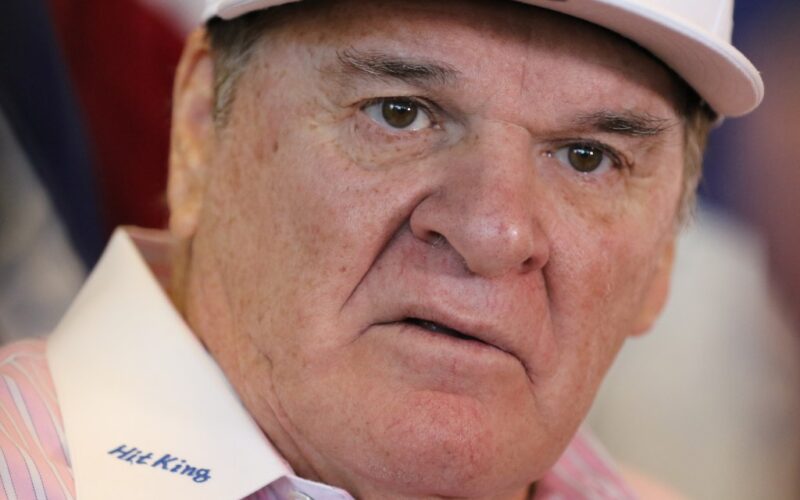Commissioner Rob Manfred’s decision to re-instate Pete Rose and Shoeless Joe Jackson from baseball’s permanent ineligible list was not nearly the bombshell surprise as lot of the media treated it. And it had nothing to do with Donald Trump’s intervention with the commissioner a few weeks ago on behalf of Rose’s family.
In truth, Manfred had no choice in making this decision, especially after Rose died last year at age 83, because of the thorny conflict of interest baseball now has with Rule 21, which prohibits betting on baseball by any players, managers, umpires, coaches and all other club officials, and baseball embracing and in partnership with gambling sites.
When I was a kid going to games at the old Yankee Stadium, the most visible sign in the ballpark was the gigantic “No Betting” sign on the center field scoreboard. Now at every game, 40,000 fans can place bets on everything from the over-under number of runs scored to the next pitch, right on their cellphones.
Sports gambling is all right out in the open now and while, thankfully, no major league players have succumbed, when Rose died, Manfred had his opening to rid himself of the case by decreeing that lifetime bans expire upon a player’s death — and dumping it back to the Hall of Fame. It is important to note here that when then-Commissioner Bart Giamatti originally placed Rose on the permanent ineligible list for betting on baseball back in 1989, he never said anything about the Hall of Fame. All he said was that Rose needed to “reconfigure his life” while presumably leaving the door open for an appeal down the road.
But in 1991, with Rose about to come up for his first year on the Baseball Writers’ Association of America ballot, the Hall of Fame formed a committee to discuss a proposal from their board of directors that anyone on the permanent ineligible list should also be ineligible to be considered for the Hall of Fame. The committee was comprised of mostly members of the Hall’s Board of Directors, plus two members of the Baseball Writers’ Association and by a 7-3 vote, the proposal was passed.
At the time, the baseball writers were furious the Hall had taken away their ability to vote on Rose. They obviously didn’t trust us to uphold the integrity of the game — which today seems rather ironic after the BBWAA failed to elect any of the obvious steroids cheats, Barry Bonds, Roger Clemens, Sammy Sosa and Mark McGwire in ten years on their ballot.
That’s why I found all the outrage over Manfred’s decision so interesting.
“This is a dark day for baseball,” proclaimed USA Today. “Apparently it’s okay to gamble on baseball now.”
Really?
Let’s be clear about this: All Manfred’s decision does to remove Rose, Jackson and 15 other deceased players from the permanent ineligible list — because, in his words, “once an individual has passed away, the purposes of Rule 21 has been served” — is to make them eligible for consideration for the Hall of Fame. There is no guarantee either Rose or Jackson, the legendary White Sox hitter who hit .356 lifetime but was banned for life for his participation I the 1919 “Black Sox” World Series fix, will be elected. Remember the Hall’s directors succeeded in keeping Rose out this long and they will be the ones making up the 16-person Classic Baseball Era committee in 2027 that will be voting on him. It takes 75% to be elected and for years the Hall’s board was able to keep Marvin Miller out by making sure at least five of their own were on the committee.
That’s why I fail to see the logic from some of my BBWAA brethren who seem to think Rose now becoming eligible for the election gives new hope for Bonds and Clemens, who were rejected for the Hall by both the writers and the Contemporary Era Veterans Committee (where they failed to get even five votes in 2022.)
Say what you will about Pete Rose — and for me his biggest sin was lying about betting on baseball for 10 years after Giamatti sentenced him — unlike the steroids cheats, he never cheated the game. All of his all-time most 4,256 hits are legit.
The case of Shoeless Joe is a little more complicated, especially since it happened over 100 years ago and there have been varying accounts as to just how culpable he was in the 1919 White Sox’s World Series fix. While Jackson never denied getting a $5,000 payment from teammate Lefty Williams, one of the eight fixers, he insisted he never took part in any of the pre-Series meetings or met with any gamblers and once he realized the fix was on, wanted no part of it. In fact, he led the Series in hitting, .375, with three doubles and a homer and also threw one runner out at home plate. In one account, Jackson is quoted as saying he tried to give the $5,000 to White Sox general manager Harry Grabiner after the Series but was told to just keep it and keep his mouth shut.
Come ’27 it figures to be a lively debate for the Classic Baseball Era committee, but as long as the subject is gambling and betting, right now I’d bet that neither Rose or Jackson gets elected.
IT’S A MADD, MADD WORLD
Bruce Bochy, one of the truly good guys in baseball, passed Sparky Anderson into sixth place on the all-time managers’ win list last week at 2,195. Bochy long ago assured his place in the Hall of Fame whenever he decides to retire, with three world championships with the Giants and the only one in the Rangers’ history in 2023. There’s been whispers that Bochy, 70, plans to retire after this year, but, if not, next ahead of him on the all-time wins list is Joe Torre at 2,326. Turns out after he began managing, Bochy got to know Sparky and they became good friends.








